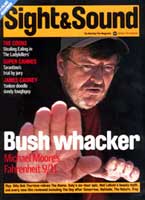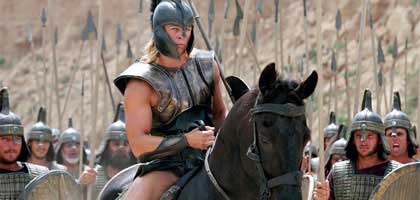
Troy
UK/USA/Malta 2004

Reviewed by Richard Kelly
Synopsis
Our synopses give away the plot in full, including surprise twists.
Three thousand two hundred years ago. Trojan princes Hector (Eric Bana) and Paris (Orlando Bloom) are entertained by Spartan king Menelaus (Brendan Gleeson), but on the voyage home Paris informs Hector that he has carried off the king's wife, Helen (Diane Krüger). Menelaus asks his brother, Mycenaean king Agamemnon (Brian Cox), to raise a Greek armada and retrieve Helen. Though despising Agamemnon, famed warrior Achilles (Brad Pitt) joins up, persuaded by his mother Thetis (Julie Christie) that his name will live forever.
Achilles' ship lands first at Troy and he captures a beachhead but, disgusted by Agamemnon's triumphalism, he retires from battle and seduces Briseis (Rose Byrne), a captured vestal virgin. Paris volunteers to settle the dispute through a duel with Menelaus, but he is bested, forcing Hector to kill the Spartan. Agamemnon orders an assault on Troy that is repelled, and Hector leads a counter attack, unwittingly killing Patroclus (Garrett Hedlund), who fought disguised in his cousin Achilles' armour. Enraged, Achilles rides to Troy's gates, challenges and kills Hector, and drags away the corpse. Trojan King Priam (Peter O'Toole) secretly visits Achilles and successfully pleads for his son's body, also taking away Briseis. The Greeks fake a retreat, leaving behind a wooden horse which the Trojans haul through their gates. By nightfall, Greek soldiers emerge from the horse and sack the city. In the mêlée Priam is slain by Agamemnon, Agamemnon by Briseis, and Achilles by Paris.
Review
William Goldman, perhaps Hollywood's closest equivalent to the Delphic oracle, has popularised the notion of screenwriting as an exercise in problem-solving, the task being to pose dramatic questions and answer them within the tautest possible time-frame. Goldman's views are especially germane to adaptation (at which he excels), since the conversion of literary matter into pictorial storytelling is usually a more hidebound business than composing an original script. And – if you will permit a leap across millennia – did not Homer himself face an analogous challenge in selecting which songs to sing of brave Achilles, based on the oral tradition of poets and tall-tale-tellers before him?
Filming the fall of Troy in 2004 carries a lot of baggage, not least because the adapting screenwriter can draw upon a vast array of sources, both archaic and modern. (The Iliad is the sole text cited in Troy's credits, and that, one suspects, is largely for prestige.) In the dying days of the old studio system, William Faulkner or Gore Vidal might be enlisted to spruce up an epic such as Land of the Pharaohs (1955) or Ben-Hur (1959). Troy has been entrusted to 33-year-old David Benioff, whose slight novel about a prison-bound drug-dealer, The 25th Hour, was made only slightly more substantive in Spike Lee's film version.
Benioff crunches the ten-year Trojan War down to around a month and – perhaps figuring, not unreasonably, that we prefer human agency to divine ordinance – he jettisons the Homeric principle of the absolute power of the gods. Instead, he foregrounds Agamemnon's (Brian Cox) material greed for dominion, and the degree to which that design is dependent on Achilles (Brad Pitt), who might let his short-sword rust were it not for the fancy that his prowess might win him eternal fame. (Individualism, and being cool about it, may be the distinctive spirit of our own age that Benioff has transposed on to Achilles'.)
So much for hubris: in respect of more intimate tragedies, we are encouraged to feel for Hector (Eric Bana), killed by a fight unworthy of him, and his father Priam (Peter O'Toole), who must kiss the killer's hand. Such is the authentic smack of The Iliad, but elsewhere Benioff embroiders considerably: in a sop to the Avril Lavigne-listening demographic, concubine Briseis (Rose Byrne) is made a regal Trojan acolyte, and as feisty as she is comely. She even gets to cut Agamemnon's throat, so cancelling The Oresteia, in which this pleasure was reserved for the king's wife.
Brad Pitt, though first among equals in the gorgeous stakes and perfectly proficient at exuding arrogance, is much less good at murderous rage and would have been ideally cast as "beautiful, woman-crazy" Paris. Instead Orlando Bloom makes a painfully callow Trojan prince, and one could be forgiven for cheering at the thorough beating he takes off Brendan Gleeson's Menelaus. As for the obligatory RSC/Rada contingent, Cox plays Agamemnon to order as a heifer in bull's clothing, and O'Toole gives a succinct master-class in the kind of bearing and diction needed for films such as this. Amid a dog's breakfast of accents, Sean Bean's South Yorkshire Odysseus puts one fondly in mind of Tony Harrison, who has adapted Aeschylus and Euripides and could probably have given Benioff some good script notes.
Wolfgang Petersen makes a decent spectacle of both the massed battle scenes and the hand-to-hand combats; the Hector/Achilles clash is especially heavyweight. But dramatic scene after dramatic scene fails to take flight: too many face-to-face quarrels, flatly blocked and bluntly written. The costuming and production design are handsome, yet nothing looks worn or lived in. James Horner's score is entirely by-rote when the meaty action quota – not to mention all the lustrous manes of hair – might have been more rousingly scored by Metallica. Still, for 163 minutes Troy is never quite boring: you watch on, curious to see how they will wrap things up. After all, and whatever one thinks of the teller, this is still perhaps the greatest story ever told.
Credits
- Director
- Wolfgang Petersen
- Producers
- Wolfgang Petersen
- Diana Rathbun
- Colin Wilson
- Screenplay
- David Benioff
- Inspired by Homer's The Iliad
- Director of Photography
- Roger Pratt
- Edited by
- Peter Honess
- Production Designer
- Nigel Phelps
- Music Composed/ Conducted by
- James Horner
